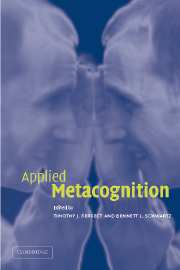Book contents
- Frontmatter
- Contents
- List of contributors
- Preface
- 1 Introduction: toward an applied metacognition
- Part 1 Metacognition in learning and education
- Part 2 Metacognition in everyday memory
- Part 3 Metacognition in different populations
- 8 Metacognition in older adults: implications for application
- 9 Sense and sensitivity: metacognition in Alzheimer's disease
- 10 The development of metacognitive knowledge in children and adolescents
- Conclusions
- References
10 - The development of metacognitive knowledge in children and adolescents
Published online by Cambridge University Press: 22 September 2009
- Frontmatter
- Contents
- List of contributors
- Preface
- 1 Introduction: toward an applied metacognition
- Part 1 Metacognition in learning and education
- Part 2 Metacognition in everyday memory
- Part 3 Metacognition in different populations
- 8 Metacognition in older adults: implications for application
- 9 Sense and sensitivity: metacognition in Alzheimer's disease
- 10 The development of metacognitive knowledge in children and adolescents
- Conclusions
- References
Summary
Historically, research on the development of metacognition, that is, knowledge about cognition, dates back to the work of Jean Piaget and his claim that young children do not know that there are such things as conceptual, perceptual, and emotional perspectives of points of view. Piaget and his colleagues used the concept of egocentrism to interpret the findings of their developmental studies on a wide variety of social-cognitive topics such as perceptual perspective taking, and understanding of thoughts, dreams, or intentions. Although there is broad agreement today that young children are not as egocentric as Piaget believed them to be, his claim that perspective-taking abilities and related psychological knowledge develop quickly over time has been confirmed in numerous studies (see Flavell, 2000).
A second line of research on metacognitive development was initiated in the early 1970s by Brown, Flavell, and their colleagues (for reviews, see Brown et al., 1983; Flavell, Miller, and Miller, 1993). At the very beginning, research focused on knowledge about memory, which was coined “metamemory” by Flavell (1971). Later on, the concept was broadened and termed “metacognition” (Flavell, 1979). Metacognition was defined as any knowledge or cognitive activity that takes as its cognitive object, or that regulates, any aspect of any cognitive activity (Flavell et al., 1993, p. 150). Obviously, this is a very broad conceptualization that includes people's knowledge of their own information-processing skills, as well as knowledge about the nature of cognitive tasks, and about strategies for coping with such tasks.
Information
- Type
- Chapter
- Information
- Applied Metacognition , pp. 224 - 258Publisher: Cambridge University PressPrint publication year: 2002
References
Accessibility standard: Unknown
Why this information is here
This section outlines the accessibility features of this content - including support for screen readers, full keyboard navigation and high-contrast display options. This may not be relevant for you.Accessibility Information
- 85
- Cited by
